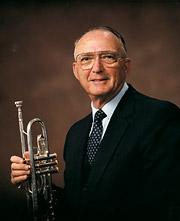 |
|||||||||||||||||

|
When you were a student at North Texas, what faculty member influenced you the most? What influence did he or she have on you? What impressed you the most about this faculty member? Not long after we posed these questions to North Texan readers, responses came in from around the country — and a few other countries. You’ll find some of the replies here. Also look for a “Faculty Who Made a Difference” column in future issues. (It’s never too late to let us know of someone at North Texas who influenced you. Send us your story at north_texan@unt.edu or The North Texan; University Relations, Communications and Marketing; P.O. Box 311070; Denton, Texas 76203-1070.) And now, the envelope, please ...
When I was an inexperienced undergraduate B.F.A. student, art history professor Lois Swan Jones had an enormous impact on me. I was concentrating in art history and planning to go to graduate school and be a professor. Then as now, Dr. Jones was my model. Her energy and enthusiasm really made me want to live up to her stringent academic standards. Her knowledge of art historical research methods was unsurpassed; I learned things from her that I never could have learned later in graduate school, and that gave me a tremendous competitive advantage. And what can I say about her lectures? Her firsthand knowledge of monuments, her humorous, personalized delivery and her genuine love for the material shone at every turn. A few years ago I saw Dr. Jones at a professional conference and had the opportunity to thank her personally for teaching me the “tools of the trade” and providing such a good model for me. I have to say, it was a bit of an emotional experience. — Joe Thomas (’82), associate professor of art history, Clarion University, Clarion, Pa. Jones passed away in August. See “Friends We’ll Miss.”
It is difficult for me to encapsulate the influence that Dr. George Morey had on me. I studied flute with him off and on from 1948 to 1968, but it would probably be more accurate to say that I studied life from him. I was only 16 when I began to hitchhike from Electra to Denton for flute lessons, and to say that I was a green farm boy is to over-simplify how naive I was. I played second flute in the first-ever Wichita Falls Symphony and Dr. Morey was hired to play first flute. That acquaintance led to flute lessons during my senior year in high school, and I immediately enrolled at North Texas during the summer semesters of 1949. Dr. Morey offered me the position of orchestra manager, a job that paid enough for my room and two meals a day (but not enough for tuition), which enabled me to stay in school. I also did babysitting with the Moreys’ two oldest children and even painted their house. Living next to them brought me into almost continuous contact, and Dr. and Mrs. Morey almost became my substitute parents. I came to North Texas once again to begin work on a doctorate and resume flute study with Dr. Morey. He was a demanding teacher, a role model of high artistic, professional and ethical standards, and above all, a friend. I miss him still. — T. Jervis Underwood (’55, ’70 Ph.D.), Professor Emeritus, Southern Illinois University-Carbondale, Oak Point
I completed a B.S. degree in clothing and textiles at North Texas and immediately decided to obtain my M.B.A. in marketing. I had a very difficult time with one of the required courses — Business Statistics. My adviser recommended that I retake the course with Dr. J.B. Spalding. She said that he had a talent for helping the student, particularly one who had never had statistics, understand the reasoning behind the curriculum. The next semester, I enrolled in the course with Dr. Spalding and from the first class, I began to understand the formulas and basis for statistics. It was like a door had been opened to me. When I was not entirely clear on the material in the lecture, Dr. Spalding would provide tutoring. I made an A in the class! I am thankful to Dr. Spalding for his patience and wonderful teaching style that enabled me to continue on and complete my M.B.A. Of all of the teachers and professors I have had during my education, he is truly the one that made a difference in my life. — Linda A. Davenport-Miller (’78, ’80 M.B.A.), Denbury Onshore LLC, Plano
Most of my classes with Tommie Lawhon were Tuesday-Thursday, late afternoon. The whole class “felt” tired, yet she came in, on time, with a smile on her face and would begin teaching. Probably her off-the-cuff comments on life affected me more than what she taught. She made it clear that life was made up by attitude, but more importantly hers always seemed positive to see us. As a student, you sometimes think the teachers are collecting a paycheck. I felt she would teach whether she got paid or not. Occasionally, I still think of her looking at the class and smiling. North Texas was fortunate to have her. — Linda Moody Roberts (’76), commercial regulatory analyst, ConocoPhillips Co., Houston I have never seen another individual so committed to the success of college students (and I have worked in higher education since graduating from UNT). Dr. Lawhon is truly the most giving individual I have ever met. One example is the semester that I became ill and upon my return to school I stopped by Dr. Lawhon’s office to discuss my course work. By the time I left her office, she had provided me with a list of restaurants that would deliver food to my apartment and had given me half of her banana and made me promise to eat it! Often times I hear college horror stories, but I always have praises for UNT and the faculty I experienced there. — Lauren L. Hayes Gray (’03), adviser and high school language arts teacher, Leading Edge Academy, Gilbert, Ariz.
During my last semester at UNT in the fall of 1991, I took Physical Anthropology from forensic anthropologist Dr. Harrell Gill-King. The first day of class he explained that he would have to miss lecture now and then because he would be testifying in court. I was fascinated by how much he could learn about a person from studying their bones. But I was going to pursue a career in music. Well, that turned out to be more challenging than I had anticipated. I ended up following in my father’s footsteps and worked for the Postal Service for 10 years. My interest in the forensic sciences continued, however. In the summer of 2001, I received a UNT publication with a picture of Dr. Gill-King hard at work. Suddenly, at age 30, I finally knew what I wanted to be when I grew up: a forensic scientist. I had no idea where to go from there, so I sent Dr. Gill-King an e-mail asking for his advice. He took time out of his schedule to correspond with me several times. His words of encouragement meant the world to me. He helped me come up with a plan to return to school. I was worried about the impact such a huge change would have on my family. He wrote, “Think of it this way: You’re worth far more to them when you’re worth far more to yourself.” It was the best advice anyone has ever given me. After some careful financial planning, I was able to quit my job and return to school. I graduated from Boise State University in May with a bachelor of science in chemistry with a forensic biochemistry emphasis — the first to graduate with this new emphasis. Currently, I am in the hiring process for a criminalist position with the Canyon County Sheriff Crime Lab in Caldwell, Idaho. I still carry hard copies of Dr. Gill-King’s e-mails with me, and when things get tough, I read his words of wisdom, like, “I’ve always been an advocate of the idea that if you can’t fall out of bed running to whatever form of honest labor you’re into, then it’s time for a change.” He also said, “Doing something that lights you up will get you through a period of skinny cash better than fat cash will get you through dreading each day on the treadmill.” He was so right and I can’t thank him enough! — Susan Hohstadt Russell (’91), Boise, Idaho
I credit Marty Schwartz with encouraging me to stay the course when things got tough. Dr. Schwartz taught the most dreaded course in the chemistry department at the time — Physical Chemistry. He was an excellent teacher and instructor. He was by far the most approachable professor in the faculty for the handful of African American students majoring in chemistry. Dr. Schwartz taught me one simple lesson — understand the fundamentals first and tackle the higher-level concepts next. After I totally bombed an exam in his Physical Chemistry course, he gave me partial credit for a problem I completely misunderstood. His comment to me was that my calculus skills were good and my integration of what I incorrectly thought was the problem was excellent. This little encouragement meant so much to me. Little did he know that I was seriously thinking about changing majors and had already planned to drop the course. I didn’t drop. I stayed the course. I took Dr. Schwartz for the second Physical Chemistry course and fared much better, and I was well on my way to completing the program. — Lendell M. Hawley (’80), senior chemist analytical, ATMI, Burnet
Lifetime Achievement: John Haynie, Professor Emeritus of trumpet, 1950-1985 John J. Haynie has been referred to as “one of the most influential trumpet teachers of the 20th century” and “one of the greatest trumpet teachers in history.” He is a man of international acclaim and influence in the field of trumpet pedagogy. The range, scope and depth of his influence quite possibly place him as the most influential teacher in the history of UNT, regardless of the subject taught. It is now quite stylish to claim, “I studied with a student of a student of John Haynie.” — R. Dale Olson (’56, ’57 M.M.), brass researcher and instrument design consultant, Fullerton, Calif.
I studied with John Haynie while I attended North Texas in 1968. I found him to be an excellent teacher and a very fine person. John was a teacher of fundamentals of the trumpet — sound production, with ease, and getting to the center of one note to the next. As I became an established studio player in Los Angeles, John’s guidance was invaluable to my versatility. — Gary Grant, studio musician, writer and producer, Los Angeles
I began studies with Professor Haynie the second semester of my freshman year, 1966. He emphasized consistent practice and diligence to routine. With each continuing semester came the adoration and respect he generated from his students. As a friend and mentor, Professor Haynie generated a belief in self, God, country and family. Many and most of his former students are still in contact with him, as proof of his teachings and friendship. — Larry D. Hodgin (’70), church mission leader, retired from the U.S. Army Band, Annandale, Va. Professor Haynie’s ability to draw out the best of our musical abilities was astounding. More important, however, was his desire to guide, guard and direct our lives so that we could become the best people we could be. He has always been just as proud of his students who went on to fill non-musical careers as he was those of us who became professional musicians. To me personally, he has been second only to my own father in importance. — Cynthia Thompson Carrell (’86), assistant professor of music, Harding University, Searcy, Ark. See the Eagle Tale for more on Professor Haynie from trumpeter Marvin Stamm (’61).
|
||||||||||||||||||||||||||||
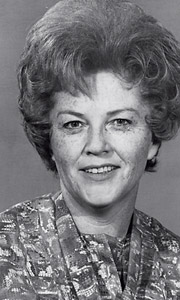 In the “Shone at Every Turn” category: the late Lois Swan Jones (’72 Ph.D.), Professor Emeritus of art, 1972-1992
In the “Shone at Every Turn” category: the late Lois Swan Jones (’72 Ph.D.), Professor Emeritus of art, 1972-1992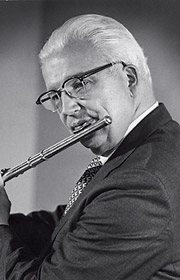 In the “Substitute Parent” category: the late George Morey, Professor Emeritus of music, 1947-1980
In the “Substitute Parent” category: the late George Morey, Professor Emeritus of music, 1947-1980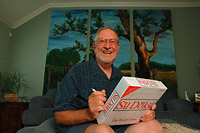 In the “Opening Doors” category: J.B. Spalding, associate professor of information technology and decision sciences, 1970-present
In the “Opening Doors” category: J.B. Spalding, associate professor of information technology and decision sciences, 1970-present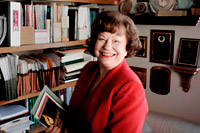 In the “Positive Attitude/Gave Me Her Banana” category: Tommie Lawhon, professor of counseling, development and higher education, 1968-present.
In the “Positive Attitude/Gave Me Her Banana” category: Tommie Lawhon, professor of counseling, development and higher education, 1968-present.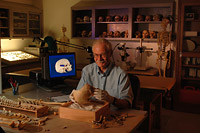 In the “Life-Changing Advice Years Later” category: Harrell Gill-King, director of the Laboratory of Forensic Anthropology and Human Identification, 1983-present
In the “Life-Changing Advice Years Later” category: Harrell Gill-King, director of the Laboratory of Forensic Anthropology and Human Identification, 1983-present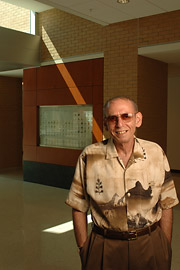 In the “Helped Me Stay the Course” category: Martin Schwartz, Regents Professor of chemistry, 1974-present
In the “Helped Me Stay the Course” category: Martin Schwartz, Regents Professor of chemistry, 1974-present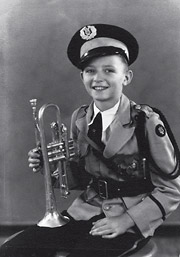
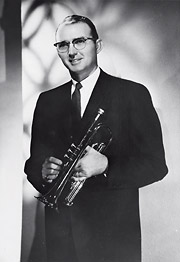 Professor Haynie truly cared about all of his students. If a student was having a problem, he wanted to know how he could help. When I taught, I always used him as an example when working with my students. I’ve chaired four “Haynie” reunions at UNT (from 1990 to 2005), and they were all well attended. All of his former students still appreciate everything he has done. — Melvin E. Gordy (’59), DBA: Gordy & Associates, building designer and architectural and engineering drafting instructor, Hitchcock
Professor Haynie truly cared about all of his students. If a student was having a problem, he wanted to know how he could help. When I taught, I always used him as an example when working with my students. I’ve chaired four “Haynie” reunions at UNT (from 1990 to 2005), and they were all well attended. All of his former students still appreciate everything he has done. — Melvin E. Gordy (’59), DBA: Gordy & Associates, building designer and architectural and engineering drafting instructor, Hitchcock